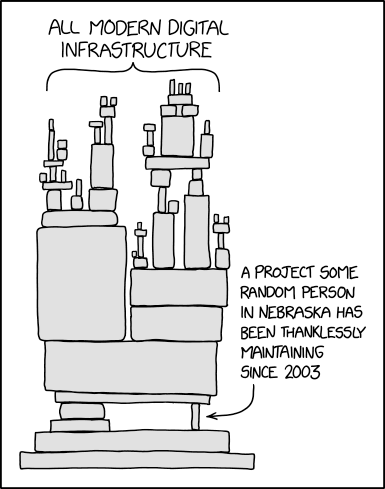Tedium - Caught In The Middle 💸
|
|
|
|
|
|
Older messages
Why Butterfingers Break 🍫
Monday, October 28, 2024
Pondering why Butterfingers are often broken in half. Here's a version for your browser. Hunting for the end of the long tail • October 27, 2024 Today in Tedium: Ok, so we're near Halloween,
Stressing The Protocol 🧮
Wednesday, October 23, 2024
What it's like to back up your tweets on Bluesky. Here's a version for your browser. Hunting for the end of the long tail • October 23, 2024 Stressing The Protocol I'm trying to import as
So, Your CMS Blew Up 💣
Sunday, October 20, 2024
So, thinking about moving from WordPress for the first time … ever? Here's a version for your browser. Hunting for the end of the long tail • October 20, 2024 Today in Tedium: Deciding on a content
Gateway Country 🐄
Sunday, October 20, 2024
What Gateway 2000's demise says about outsourcing and globalization. Here's a version for your browser. Hunting for the end of the long tail • October 13, 2024 Hey all, Ernie here with a
Gatekept 🚪
Sunday, October 20, 2024
I just got hit by a stab to the ego. Ow, that hurt. Here's a version for your browser. Hunting for the end of the long tail • October 15, 2024 Gatekept Thoughts on a bruise to the ol' ego that
You Might Also Like
Meta Is Unbundling... Again
Friday, February 28, 2025
The strategy behind the stand-alone apps for Reels and Meta AI... Meta Is Unbundling... Again The strategy behind the stand-alone apps for Reels and Meta AI... By MG Siegler • 28 Feb 2025 View in
📧 Did you watch the FREE chapter of Pragmatic REST APIs?
Friday, February 28, 2025
Hey, it's Milan. 👋 The weekend is almost upon us. So, if you're up for some quality learning, consider watching the free chapter of Pragmatic REST APIs. Scroll down to the curriculum or click
Data Science Weekly - Issue 588
Thursday, February 27, 2025
Curated news, articles and jobs related to Data Science, AI, & Machine Learning ͏ ͏ ͏ ͏ ͏ ͏ ͏ ͏ ͏ ͏ ͏ ͏ ͏ ͏ ͏ ͏ ͏ ͏ ͏ ͏ ͏ ͏ ͏ ͏ ͏ ͏ ͏ ͏ ͏ ͏ ͏ ͏ ͏ ͏ ͏ ͏ ͏ ͏ ͏ ͏ ͏ ͏ ͏ ͏ ͏ ͏ ͏ ͏ ͏ ͏ ͏ ͏ ͏ ͏ ͏ ͏ ͏ ͏ ͏
💎 Issue 458 - Why Ruby on Rails still matters
Thursday, February 27, 2025
This week's Awesome Ruby Newsletter Read this email on the Web The Awesome Ruby Newsletter Issue » 458 Release Date Feb 27, 2025 Your weekly report of the most popular Ruby news, articles and
📱 Issue 452 - Three questions about Apple, encryption, and the U.K
Thursday, February 27, 2025
This week's Awesome iOS Weekly Read this email on the Web The Awesome iOS Weekly Issue » 452 Release Date Feb 27, 2025 Your weekly report of the most popular iOS news, articles and projects Popular
💻 Issue 451 - .NET 10 Preview 1 is now available!
Thursday, February 27, 2025
This week's Awesome .NET Weekly Read this email on the Web The Awesome .NET Weekly Issue » 451 Release Date Feb 27, 2025 Your weekly report of the most popular .NET news, articles and projects
💻 Issue 458 - Full Stack Security Essentials: Preventing CSRF, Clickjacking, and Ensuring Content Integrity in JavaScript
Thursday, February 27, 2025
This week's Awesome Node.js Weekly Read this email on the Web The Awesome Node.js Weekly Issue » 458 Release Date Feb 27, 2025 Your weekly report of the most popular Node.js news, articles and
💻 Issue 458 - TypeScript types can run DOOM
Thursday, February 27, 2025
This week's Awesome JavaScript Weekly Read this email on the Web The Awesome JavaScript Weekly Issue » 458 Release Date Feb 27, 2025 Your weekly report of the most popular JavaScript news, articles
💻 Issue 453 - Linus Torvalds Clearly Lays Out Linux Maintainer Roles Around Rust Code
Thursday, February 27, 2025
This week's Awesome Rust Weekly Read this email on the Web The Awesome Rust Weekly Issue » 453 Release Date Feb 27, 2025 Your weekly report of the most popular Rust news, articles and projects
💻 Issue 376 - Top 10 React Libraries/Frameworks for 2025 🚀
Thursday, February 27, 2025
This week's Awesome React Weekly Read this email on the Web The Awesome React Weekly Issue » 376 Release Date Feb 27, 2025 Your weekly report of the most popular React news, articles and projects





